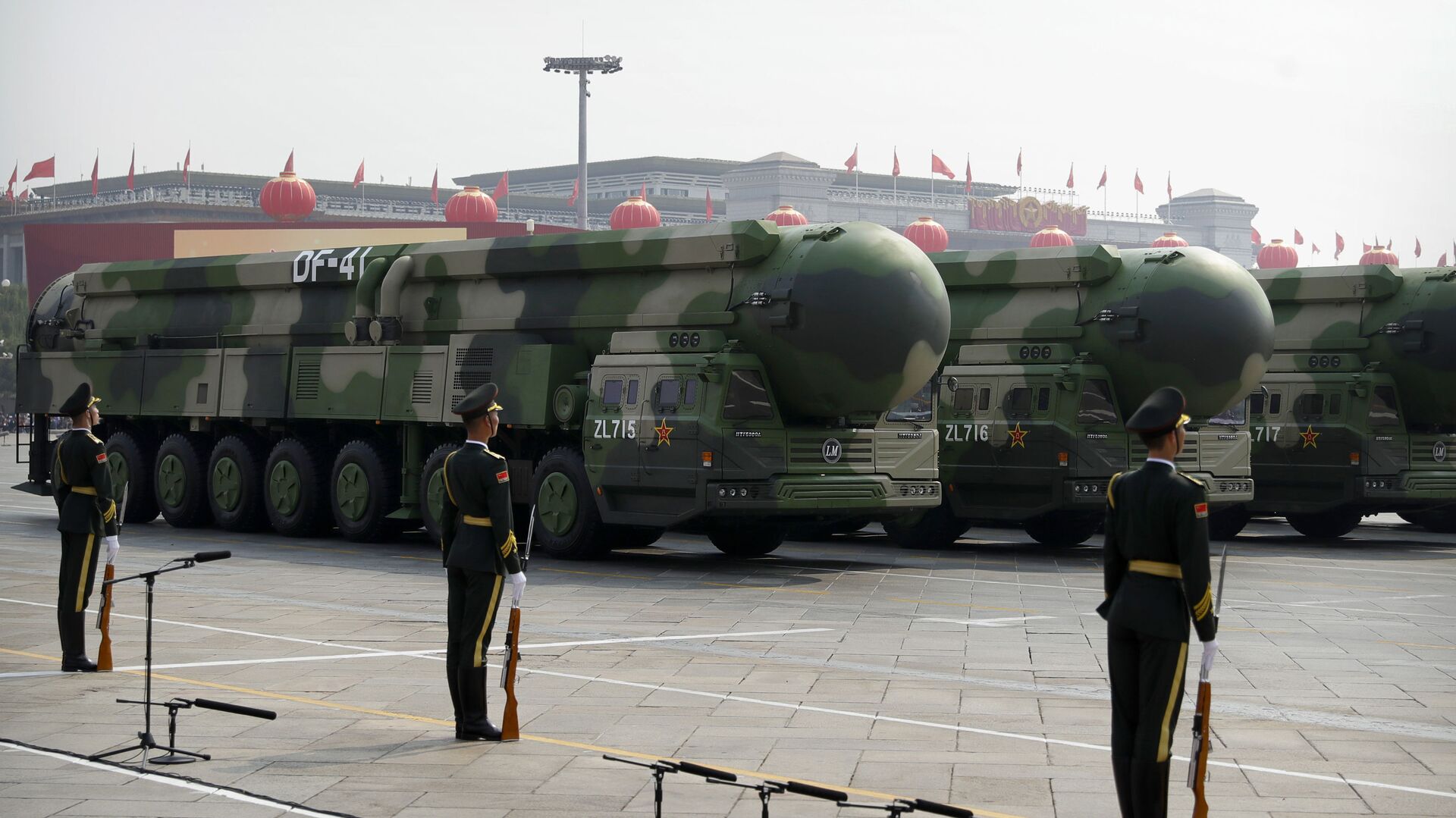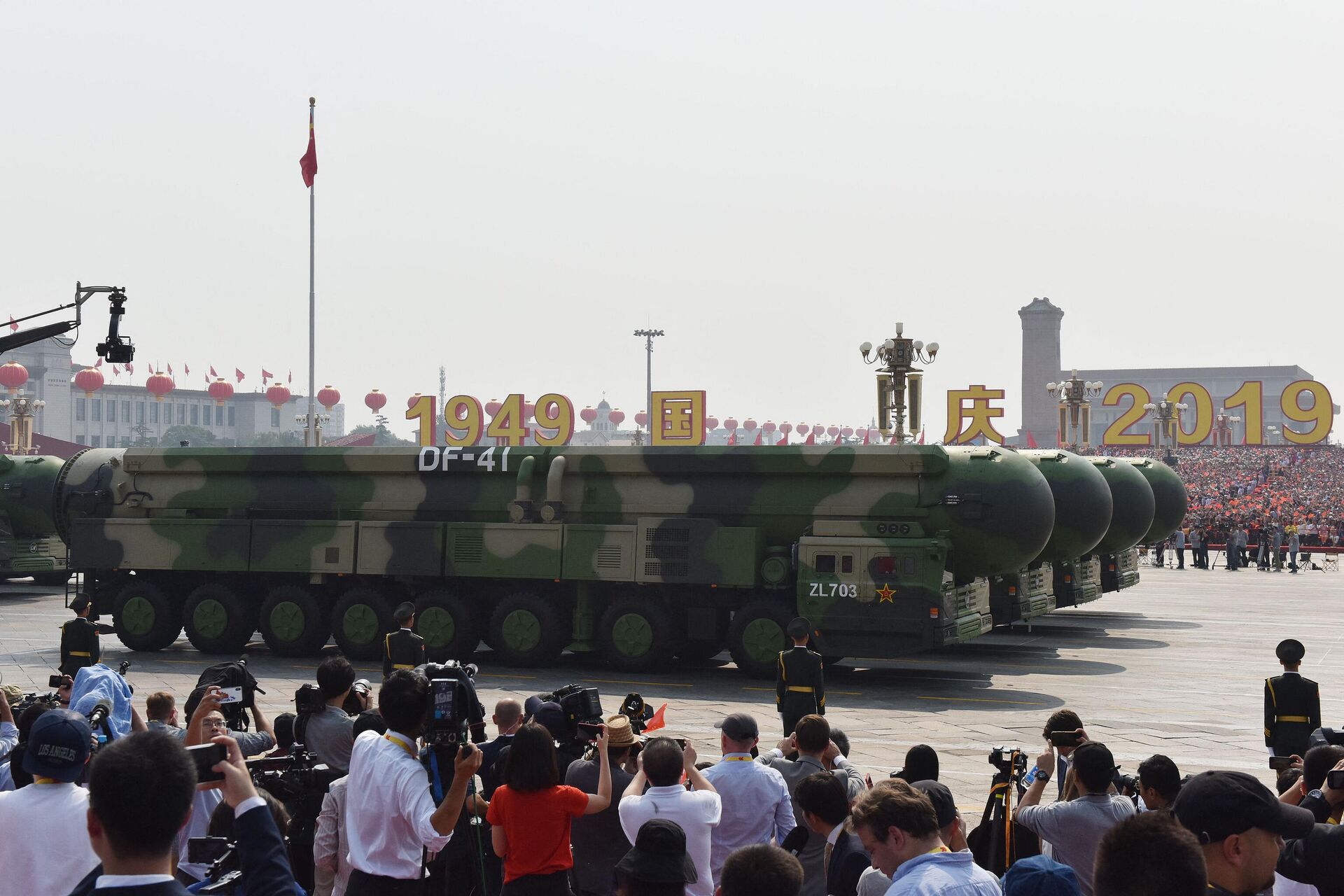How Many Nukes Does China Have?

© AP Photo / Mark Schiefelbein
Subscribe
Beijing has repeatedly slammed the Pentagon’s reports on China’s growing nuclear arsenal, stressing that the PRC keeps these capabilities “at the minimum level required by national security.”
China and the US are due to discuss nuclear arms control next week, in what will be the first such talks since the Obama administration, the Wall Street Journal has reported.
The Chinese Foreign Ministry in turn said without elaborating that the two countries would hold "consultations on arms control and nuclear non-proliferation" in the coming days. The forthcoming talks come as the issue of Chinese nukes continues to grab the headlines in the PRC and beyond. So how many nuclear warheads does China possess right now? Sputnik explores.
First and foremost, it’s worth noting that China remains just one of the five states officially possessing nuclear weapons under the Treaty on the Non-Proliferation of Nuclear Weapons that does not provide any information about its military forces, including the nuclear component. Apart from China, the list includes Russia, the US, the UK and France.
Given Beijing remaining tight-lipped on the issue, relevant information can only be obtained from the press and annual reports released by the US Department of Defense (DoD), which were not independently verified.
2023 Pentagon Report
In the Pentagon's report last month on Beijing's military capabilities, it was stated that China has currently amassed more than 500 operational nuclear warheads. Furthermore, the report suggests that China is actively progressing towards increasing its arsenal, with projections indicating that they could possess over 1,000 nuclear warheads by 2030.
Media outlets cited an unnamed senior US official as saying that Washington sees “the PRC [People's Republic of China] continuing to quite rapidly modernize and diversify and expand its nuclear forces."
"What they're doing now if you compare it to what they were doing about a decade ago, it really far exceeds that in terms of scale and complexity," the official added.
“They’re expanding and investing in their land, sea and air-based nuclear delivery platforms, as well as the infrastructure that’s required to support this quite major expansion of their nuclear forces,” the official claimed.
The Chinese Foreign Ministry lambasted the report, which it said "like similar reports before it, ignores the facts and is full of prejudice."
Previous Pentagon Findings
Last year’s DoD report on China’s nuclear arsenal warned that Beijing was rapidly modernizing its nuclear force, purportedly being on track to boost the number of warheads it has to 1,500 by 2035.
The Pentagon's report from 2021, in turn, claimed that the purported ever-increasing pace of China's nuclear expansion may allow Beijing to possess up to 700 deliverable nuclear warheads by 2027 and 1,000 warheads by 2030, 2.5 times more than previously estimated.
The DoD also routinely argued in the survey that China has expanded its nuclear arsenal much quicker than anticipated.
The Chinese Foreign Ministry responded by slamming the report as a document that distorts facts […]" pertaining to China's nuclear potential.
Chinese Foreign Ministry spokesperson Zhao Lijian pointed out that Beijing has "exercised utmost restraint in developing nuclear capabilities." The spokesperson underscored that China has “kept those capabilities at the minimum level required by national security.”
The state-run Chinese tabloid Global Times also hit back at the report, stressing that "no one knows the accuracy of the figures tossed out by the Pentagon." According to the media outlet, China's nuclear arsenal “is one of the top state secrets, [and] any description of China's nuclear power building by Washington is speculative."
Stockpile to Triple by 2030?
Separate sources argue that China now only maintains about 300 or 350 nuclear warheads that can be delivered by intercontinental ballistic missiles (ICBMs), including the Dong Feng (DF)-4, the DF-5A, the DF-31, the DF-31A, and the DF-41.

Military vehicles carry China's DF-41 nuclear-capable intercontinental ballistic missiles in a military parade at Tiananmen Square in Beijing on October 1, 2019, to mark the 70th anniversary of the founding of the People's Republic of China.
© AFP 2023 / GREG BAKER
Additionally, the PRC has the hypersonic medium range DF-17 ICBM, which Beijing claims can carry nuclear warheads.
According to the London-based Institute for Strategic Studies think tank, China’s nuclear delivery vehicles also include Type-094 and Type-096 nuclear-powered submarines as well as the H-6 and the H-6K bombers plus the new-generation H-20 strategic bomber.
Japan’s Kyodo news agency has meanwhile reported that China is considering tripling its current stockpile of nuclear warheads to 900 by 2035, as tensions between Beijing and Washington are expected to escalate further over the issue of Taiwan.
The news outlet cited unnamed sources as saying the number of nuclear warheads held by China is likely to rise to 550 in 2027. The sources argued that the plan to increase the nukes, mapped out by the People's Liberation Army, has already been approved by President Xi Jinping.
Russia's Stance on China's Nuclear Potential
The build-up of Beijing’s nuclear potential does not alarm Russia, Kremlin Spokesman Dmitry Peskov pointed our last month.
"No, this does not cause concern, we have an advanced strategic partnership relationship [with China]," Peskov told a briefing, when replying to a relevant question.
“We have the most advanced stage of political dialogue and economic cooperation, and in this case, of course, China, which is pushing off with very serious challenges to its own security in the region, is taking the steps that it considers appropriate. This is an absolutely sovereign right of the country," the Kremlin spokesman emphasized.


